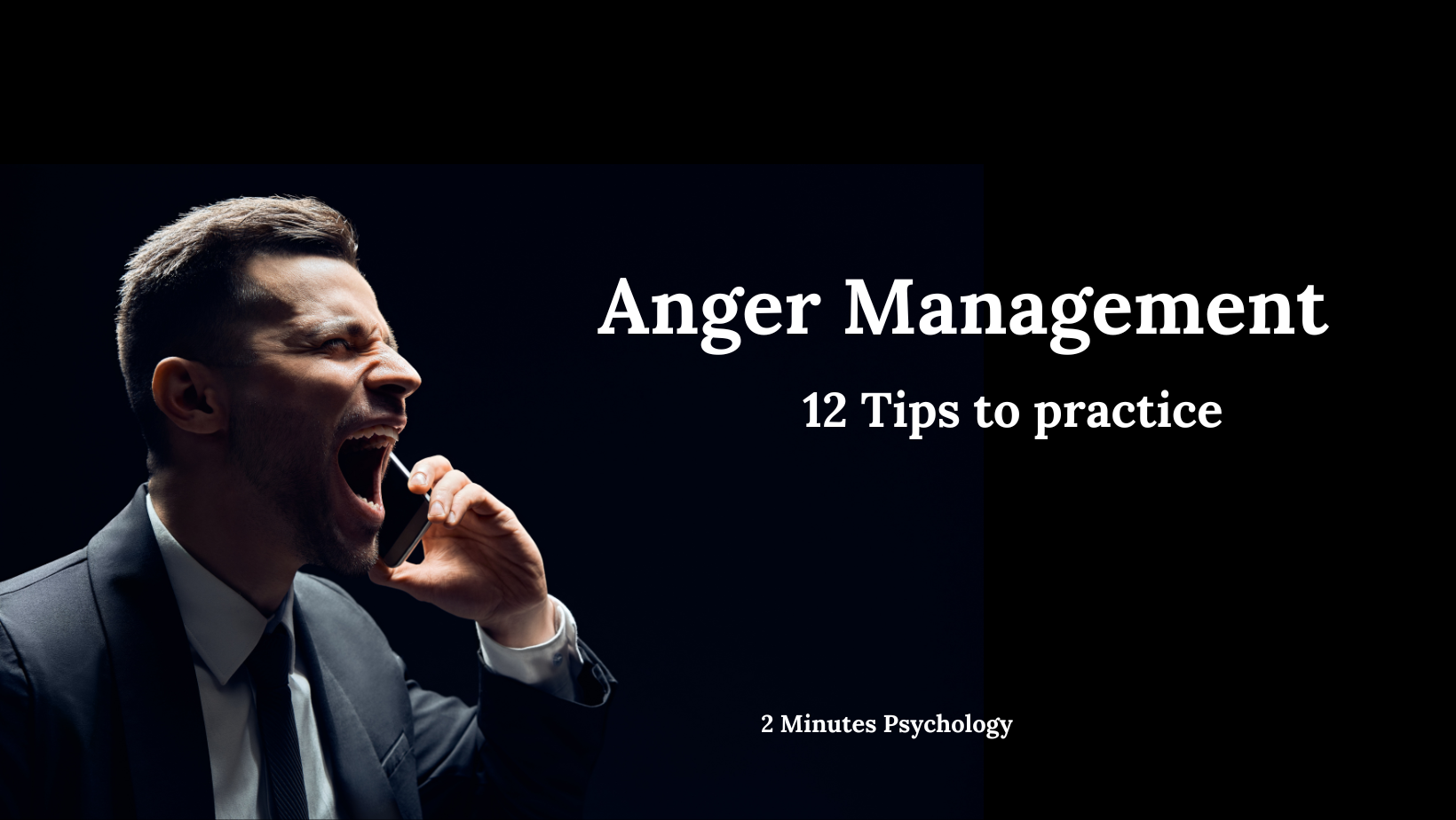Yes, with right intervention and proper practice we can manager anger issues.

Manage Your Anger: Tips From a Professional Therapist.

2 Minutes Psychology
Sep 10, 2025
Anger is a natural and primary emotion that everyone experiences. It can be described as a strong feeling of displeasure, annoyance, or hostility. Here's a more detailed breakdown:
Characteristics of Anger:
Emotional State:
At its core, anger is an emotional response to certain situations or triggers. It can range from mild irritation to intense fury and rage.
Physiological Response:
Anger can trigger physical reactions in the body, such as an increased heart rate, elevated blood pressure, and a surge in adrenaline levels.
Cognitive Aspect:
When angry, a person might perceive threats more easily, even if they aren't real. Their focus might narrow to the source of their anger, and they might struggle to think clearly or rationally.
Behavioral Response:
Anger can lead to aggressive behaviors, such as shouting, throwing things, or even physical violence. However, not everyone expresses anger outwardly; some might suppress or internalize it.
Causes of Anger:
1. Personal Problems or Conflicts in Relationships:
Explanation: Interpersonal conflicts, whether with family, friends, or colleagues, can be a significant source of anger. Misunderstandings, differing expectations, or betrayal can lead to feelings of hurt and anger.
Example: Imagine a scenario where a person feels their partner is not contributing equally to household chores. Over time, this perceived imbalance can lead to resentment and anger.
2. Frustration Due to Blocked Goals or Unmet Needs:
Explanation: When individuals face obstacles that prevent them from achieving a goal or fulfilling a need, it can lead to frustration. If this frustration is not addressed, it can escalate into anger.
Example: A worker who has been striving for a promotion but gets passed over multiple times might feel frustrated and angry, especially if they believe their efforts need to be recognized.
3. Feeling Disrespected, Undervalued, or Treated Unfairly:
Explanation: Everyone has a fundamental need to feel valued and respected. When this need is not met, or when someone feels they've been treated unjustly, it can lead to anger.
Example: A student who puts a lot of effort into a group project but feels their contributions are being ignored or undervalued by their peers might feel angry about the perceived lack of recognition.
4. Memories of Traumatic or Enraging Events:
Explanation: Past events, especially those that were traumatic or caused intense anger, can trigger anger when remembered or when similar situations arise.
Example: Someone who was bullied in school might feel a surge of anger when they witness someone else being bullied or when they encounter their past bully, even years later.
5. Certain Conditions or Disorders, Such as Chronic Pain or Mental Health Disorders:
Explanation: Physical pain or discomfort, especially if chronic, can make individuals more irritable or less tolerant of other stressors. Similarly, some mental health disorders, like bipolar disorder or borderline personality disorder, can have anger as a symptom.
Example: A person suffering from chronic back pain might become easily angered by minor inconveniences, like a spilled drink because their baseline level of discomfort and stress is already high. On the mental health side, someone with borderline personality disorder might experience intense and sudden bouts of anger in response to perceived slights or rejections.
Understanding the root causes of anger is crucial for effective management and resolution. By recognizing these triggers in daily life, individuals can develop strategies to cope with or address the sources of their anger.
Once you have figured out the reason for anger, the next step is to check the techniques and practice them on a regular basis. Please note that everyone has different symptoms for different reasons. To get the best results of anger management tips, core reasons for anger have to be figured out; for this, please consult our professional therapist.
12 Tips to Manage Your Anger
Managing anger effectively is crucial for maintaining healthy relationships and overall well-being. Before starting these tips, please keep in mind that your anger has taken years to develop, similarly practicing attitude or behaviors contrary to your anger will take time. Keep it in your daily practice, further management depends on your situation and condition.
Here are several strategies to help individuals cope with and control their anger:
1. Deep Breathing:
Explanation: Taking slow, deep breaths can help calm the body's physiological response to anger.
How to Use: When feeling angry, take a deep breath through the nose, hold for a few seconds, and then exhale slowly through the mouth. Repeat several times until you feel calmer.
2. Time-Out:
Explanation: Removing oneself from a triggering situation can prevent escalation and provide time to cool down.
How to Use: If a conversation or situation is heating up, take a break. Step outside, go for a walk or find a quiet place to regroup.
3. Cognitive Restructuring:
Explanation: This involves changing the way you think about a situation. Instead of thinking in absolutes or catastrophizing, try to think more rationally.
How to Use: Replace thoughts like "This is the worst thing ever!" with "This is frustrating, but it's not the end of the world."
4. Problem-Solving:
Explanation: If anger arises from a specific problem or situation, addressing it directly can help.
How to Use: Identify the root cause of the anger and brainstorm possible solutions. For instance, if traffic makes you angry every morning, consider leaving earlier or finding an alternate route.
5. Better Communication:
Explanation: Misunderstandings can lead to anger. Taking a moment to listen and communicate clearly can prevent this.
How to Use: If you feel upset, take a moment to think before speaking. Listen actively to what the other person is saying without interrupting.
6. Using "I" Statements:
Explanation: This prevents placing blame and expresses feelings in a non-confrontational manner.
How to Use: Instead of saying, "You never listen to me," say, "I feel unheard when you don't pay attention to what I'm saying."
7. Seek Distractions:
Explanation: Engaging in a different activity can divert attention from the source of anger.
How to Use: Read a book, listen to music, or engage in a hobby when feeling angry.
8. Relaxation Techniques:
Explanation: Techniques like meditation, visualization, or progressive muscle relaxation can help calm the mind and body.
How to Use: Dedicate a few minutes each day to practice these techniques, or use them as needed when feeling angry.
9. Physical Activity:
Explanation: Exercise can reduce stress and help manage anger.
How to Use: When feeling angry, go for a walk, run, or engage in any physical activity you enjoy.
10. Seek Support:
Explanation: Talking to someone you trust or seeking professional help can provide strategies to manage anger.
How to Use: Consider joining an anger management group, seeing a therapist, or simply talking to a friend about your feelings.
11. Avoid Alcohol and Drugs:
Explanation: These can impair judgment and increase impulsivity, potentially leading to increased aggression.
How to Use: Limit or avoid consumption, especially in situations where you might be prone to anger.
12. Practice Empathy:
Explanation: Trying to see things from another person's perspective can reduce anger and frustration.
How to Use: When someone upsets you, try to understand their feelings, needs, or concerns.
Remember, everyone feels anger from time to time. It's a natural emotion. The key is to manage it in a way that doesn't harm oneself or others. If anger becomes chronic or uncontrollable, seeking professional help is advisable. Join Let's Meet- Free Online Chat Therapy for free support.
Community
Share your experience
Let's Meet 2 Minutes Psychology
Aug 28
Remember
Let's Meet 2 Minutes Psychology
Aug 28
Cognitive Behavioral Therapy (CBT) and anxiety coping skills
Let's Meet 2 Minutes Psychology
Aug 28
Anxiety coping skills for teens
Let's Meet 2 Minutes Psychology
Aug 28
Grounding techniques
Let's Meet 2 Minutes Psychology
Aug 28
Related Posts
Categories
FREQUENTLY ASKED QUESTIONS
Does Anger Management work?
Do i need anger management?
For this the best answer is, we can have a quick evaluation; if you are feeling guilty after making some statements and actions. instead of just repent we can go with a management solution.
What are 10 best anger management methods?
10 Best Anger Management Tips: 1. Deep Breathing 2. Thought stopping 3. Cognitive Restructuring 4. Problem Solving 5. Better Communication 6. Clear Communication 7. Seek Distractions 8. Avoid addictive substances 9. Seek Support 10. Professional Help
.png)

